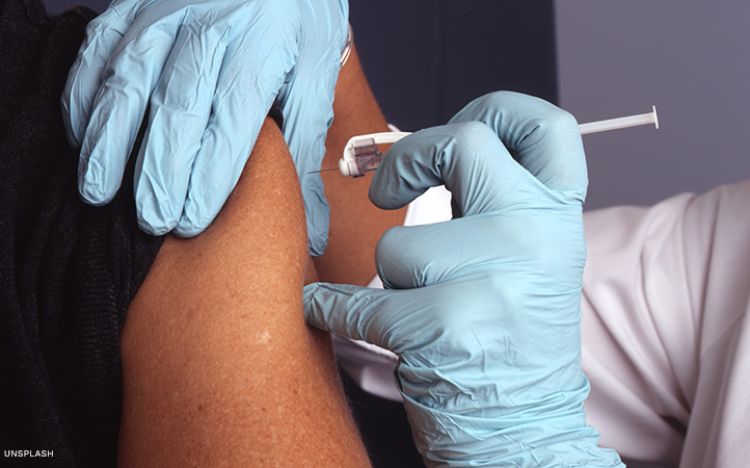Before you get a flu shot, get good sleep to increase its effectiveness, experts say

(CNN) -- We all know how much better we feel after a good night's sleep.
It turns out that sleep may be vital to arm us in the fight against influenza and Covid-19.
Medical professionals are recommending that people make sure to get their flu shots this year, in part because some Covid-19 and flu symptoms are similar. A flu shot reduces the likelihood that your symptoms (if you get sick) are from the flu.
To make that flu shot effective, sleep specialist Matthew Walker, the bestselling author of "Why We Sleep," told CNN's Christiane Amanpourpracticing "good sleep hygiene" is important.
Insufficient sleep in the week before getting a flu shot can lead to the production of less than 50% of the normal antibody response -- a reaction that would render the flu shot largely ineffective, Walker told Amanpour. Walker specializes in the relationship between sleep and human health at the University of California, Berkeley.
Walker cited a 2002 study published by the Journal of the American Medical Association, and a 2020 study in the International Journal of Behavioral Medicine supports those findings, suggesting that sleep on nights prior to vaccination could be critical to vaccine efficacy.
Walter Reed Army Institute of Research does have ongoing studies investigating the relationship between sleep and immunity and future planned studies to investigate sleep and vaccine efficacy.
For Walker, examinations like this could represent a huge breakthrough for our resistance to the coronavirus. "We then need to study, is there that same relationship between sleep and your successful Covid immunization, because if there is, then that could also be a game changer," he said.
Sleep strengthens our immune systems
Lack of sleep doesn't just reduce the effectiveness of the flu shot.
That's because your body is actually repairing and restoring itself on a cellular level while you sleep.
"Individuals who are sleeping less than seven hours are three times more likely to become infected by the rhinovirus, or the common cold," Walker said. "We know that individuals who are sleeping five hours or less a night are 70% more likely to contract pneumonia."
We're supposed to get between seven and 10 hours of sleep each night, depending on age. A variety of health conditions -- including mood swings, paranoia, depression, high blood pressure, a weakened immune system, weight gain and lower libido --- have been linked to lack of sleep in studies. It's also linked to a higher risk of some cancers, dementia, diabetes, stroke and cardiovascular disease.
Sleeping less than the recommended amount on a regular basis could even double your risk of dying early, according to a longitudinal study of 10,308 British civil servants. People who reduced their sleep from seven to five hours or fewer a night were nearly twice as likely to die from all causes, researchers found, but especially from cardiovascular disease.
Is it hard to sleep right now?
It can be hard to get good sleep right now. There has been reported uptick in people sleeping badly during the pandemic. A study by the Kaiser Family Foundation found that 36% of Americans reported difficulty sleeping this summer due to stress about the pandemic.
It's clear, Walker said, that the economic instability and anxiety about catching the virus has significantly contributed to an increase in sleep disruption.
But it's not all bad news. Some people's sleep has actually slightly increased, Walker said.
A survey conducted by Monash University in Melbourne, Australia, suggested why this may be the case. Initial results taken by around 1,600 people from 60 countries showed that 42% said they were getting better sleep, reporting a sleep-wake behavior more in line with their body clocks. These findings will publish later this year.
With a second wave on the horizon and the "new normal" of our routines at home, manypeople no longer have to wake early to commute to work or get the kids up early from school. "If there's flexibility, people start to drift closer to their natural tendencies," Walker said.
If you're having trouble sleeping, here are some steps you can take. (It's worth consulting your doctor if you're worried about your sleep.)
Need more sleep? Here's how
You can train your body to get more restful sleep with a few key steps:
- Make sure your bed and pillows are comfortable and the room is cool: Between 60 and 67 degrees is best. Don't work or watch TV in your bedroom, so your brain knows that your bedroom is just for sleeping.
- Avoid coffea, tea and other stimulants after 3 p.m. and fatty foods before bedtime.
- Eliminate the blue light of cellphones or laptops and all other lights for bedtime (and dull sounds, too). Use earplugs or a white noise machine if you need to (but you can also get a white noise effect with a humidifier or fan).
- Get good exposure to natural light during the day, since that will help regulate your circadian rhythm.
- Establish a nightly bedtime routine. Taking a warm shower or bath, listening to calm music, reading a book, meditating or doing light stretches are all good options.
- Finally, sign up for the CNN sleep newsletter, Sleep, But Better, and take steps toward improving your sleep.
The-CNN-Wire™ & © 2020 Cable News Network, Inc., a WarnerMedia Company. All rights reserved.



